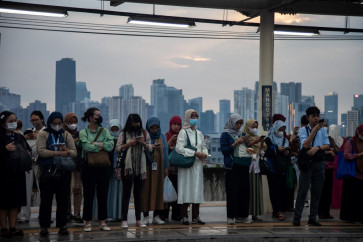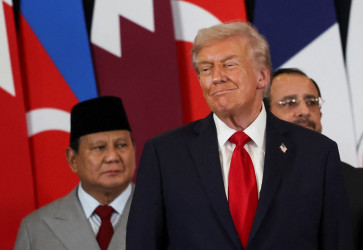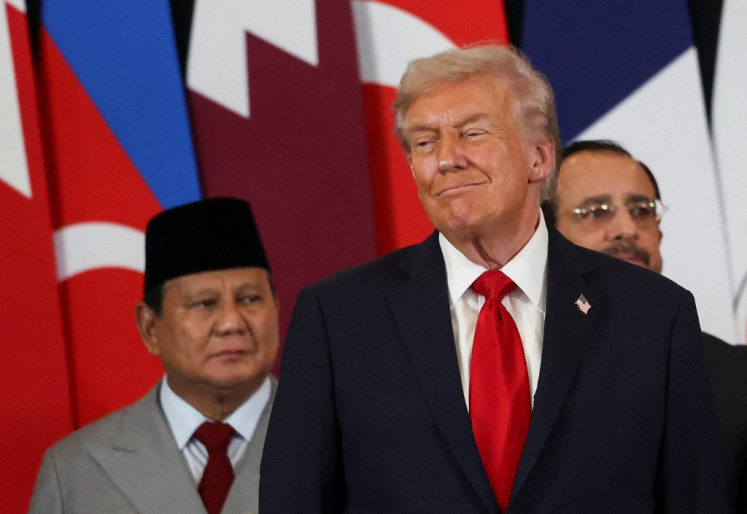Popular Reads
Top Results
Can't find what you're looking for?
View all search resultsPopular Reads
Top Results
Can't find what you're looking for?
View all search resultsLawmakers the butt of the joke in the tobacco war
Outgoing legislators may well be remembered for their crude sense of humor, but their last legacy, losing a contentious provision on tobacco from the health bill they endorsed, absolutely deserves not only a good laugh, but also a criminal investigation
Change text size
Gift Premium Articles
to Anyone
O
utgoing legislators may well be remembered for their crude sense of humor, but their last legacy, losing a contentious provision on tobacco from the health bill they endorsed, absolutely deserves not only a good laugh, but also a criminal investigation.
Over the past week, people have been amused, curious and outraged at the same time about the missing key "tobacco provision", which has become a subject of heated debate during the deliberations in which the interests of many stakeholders were involved.
It was a good thing that some former members of the special legislative committee in charge of deliberating the much-anticipated bill realized that one of the three paragraphs in chapter 113 of the finalized bill was conspicuously missing, while the bundle had already been submitted to the state secretariat for President Susilo Bambang Yudho-yono to sign into law.
The media detailed the sophistication of the omitted paragraph. The original three paragraphs in chapter 113 were reduced to two, in such a way that only people who were directly involved in the deliberations would be able to spot the funny mistake.
The lawmakers vividly remember the disputed provision was there when the bill was endorsed by the House plenary meeting and they share the suspicion the paragraph was deliberately omitted.
The lost provision singles out tobacco as an addictive and dangerous substance the use of which will be more tightly regulated under the law. This was a key issue that had survived bitter debates during deliberations of the bill because it would have wide-ranging ramifications on the multi-billion dollar tobacco business.
Advocates hoped the provision would account for a stronger legal basis for the government to better protect citizens from the danger of cigarettes and to reign in the tobacco industry. But critics, notably the tobacco industry, have always sought lenient laws that will not harm their business.
The omitted paragraph states, "The addictive substances ... include: Tobacco, derivative products containing solid, liquid and gaseous tobacco, which are addictive in nature and the use of which can cause health hazards to oneself and/or others".
After a storm of protests, the House assured the disappearance was all unintentional and that the "tobacco provision" has been put back in the draft bill that the President will sign into law.
Missing provisions have never happened before. Well, at least there has never been one that has caused such a national uproar as this one.
The scandalous incident has prompted speculations about collusion between some individual lawmakers or House employees and cigarette companies who had been unsuccessful at having the provision dropped from the bill.
But Umar Wahid, a deputy chairman of the special committee deliberating the bill swore the incident resulted from an honest misunderstanding on the part of the House's secretariat employees, who assumed that after all those fierce debates, the proposition had been dropped.
"The missing paragraph has been restored," Umar told Koran Tempo daily, which also reported that PT HM Sampoerna, Indonesia's largest cigarette maker, claimed it knew nothing about the disputed provision.
The suspicion is only well-founded because it has become a public secret that cigarette makers, who are among the country's biggest taxpayers, had been lobbying hard to ensure the new law would not harm their extremely lucrative businesses.
The commodity is heavily taxed and accounts for 95 percent of Indonesia's excise revenues.
The World Health Organization says that Indonesians spend on average 2.5 times more on tobacco than on education, and 3.2 times more on tobacco than on health. It estimates that 58.3 percent of men and 2.9 percent of Indonesian women smoke.
Indonesia consumes 1,122 cigarettes per person each year, according to the International Resource Center, with the number of female smokers rising especially among professionals in urban areas, where the habit is considered trendy.
Although its citizens are among the world's worst addicts and various measures have been taken to control smoking, Indonesia is yet to ratify the WHO Framework Convention on Tobacco Control (FCTC).
Once ratifying the convention, the signatory is bound to implement scientifically proven measures to reduce tobacco consumption.
The government has taken some measures to minimize tobacco consumption by, for example, imposing hefty taxes on tobacco products, regulating cigarette advertisements in the media and in some instances banning smoking in public places with a varying degree of success.










